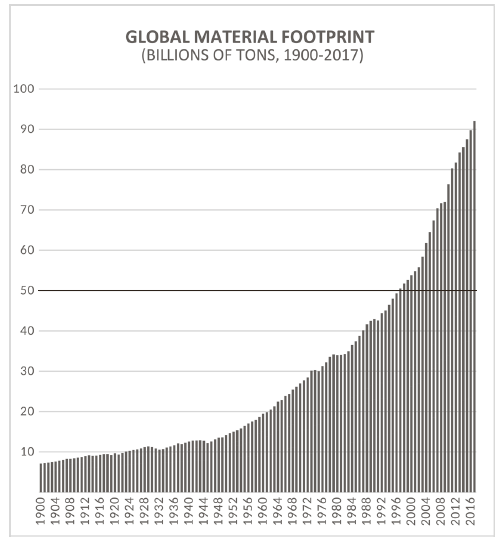
It is possible (indeed, necessary) for the USA to scale down aggregate resource and energy use while at the *same time* ending hunger and poverty, and providing universal healthcare for all. The notion that the US needs *more* resource and energy throughput to do this is absurd.
https://twitter.com/Matthuber78/status/1372521949964988417
For perspective: the USA uses 66 billion GJ of final energy and 11 billion tons of materials per year. If the whole world consumed at that rate, global energy use would quadruple and global resource use would nearly triple. This is not compatible with a habitable planet.
Per capita energy use in the USA is 200 GJ. That's at least 10x more than is necessary to deliver high levels of well-being for all, plus universal public healthcare, education, transportation, computing, housing, healthy food, insulin, etc. Zero poverty and hunger.
The US could scale down energy use by a lot, and achieve all its social goals and more. Same with resources. US resource use is at least 5x in excess of what is required for high levels of well-being and universal provisioning.
So why are so many US Americans poor despite such extraordinary energy and resource use? Because the US economy is organized around growthism, commodification and elite accumulation (oh, and militarism) rather than around meeting human needs. So that's what we need to fix.
By the way, all those resources that the US sucks up? They are largely extracted from communities in the global South, under imperialist terms. And US emissions are the single largest driver of climate breakdown, which disproportionately harms the South. thelancet.com/journals/lanpl…
The notion that the US should *not* scale down resource and energy use is a slap in the face to the South. It's tantamount to saying the South can burn, and imperialist relations can continue, because the US can't be bothered to sort out its wildly destructive and unjust economy.
That is not a morally acceptable position. The struggle against ecological breakdown requires solidarity with the South. And solidarity with the South requires degrowth in the North.
• • •
Missing some Tweet in this thread? You can try to
force a refresh



